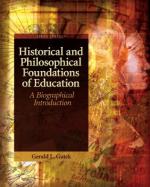
|
Part I
1. In what year was the 4th edition released?
(a) 2008.
(b) 2002.
(c) 2001.
(d) 2005.
2. Approximately how many years had Gutek been teaching when this version was released?
(a) 20.
(b) 40.
(c) 25.
(d) 30.
3. According to the text, educational biography is all but which of the following?
(a) Neglected.
(b) Unworthy.
(c) Powerful.
(d) Valuable.
4. Gutek assumes that educators interacted with which of the following?
(a) Government.
(b) Culture.
(c) Politics.
(d) Families.
5. Which is not among the first four people discussed by Gutek?
(a) Plato.
(b) Aristotle.
(c) Confucius.
(d) Calvin.
6. Which is not a Greco-Roman?
(a) Quintilian.
(b) Erasmus.
(c) Plato.
(d) Aristotle.
7. Gutek discusses which type of reformation?
(a) Protestant Reformation.
(b) Calvinist Reformation.
(c) Confucianist Reformation.
(d) Methodist Reformation.
8. What is the word used for "all-knowledge?"
(a) Pansophism.
(b) Solopsism.
(c) Omnipresence.
(d) Inference.
9. "All-knowledge" refers to thoughts and philosophies from ________ and Calvin.
(a) Comenius.
(b) Erasmus.
(c) Rousseau.
(d) Plato.
10. ________ and Pestalozzi's educational reform is presented.
(a) Aristotle.
(b) Plato.
(c) Rousseau.
(d) Aquinas.
11. Gutek states that Enlightenment brought _________.
(a) Renaissance.
(b) Americanization.
(c) Reintegration.
(d) Reformation.
12. Who was involved in this new movement?
(a) Sigmund Freud.
(b) Thomas Jefferson.
(c) John Calvin.
(d) Thomas Aquinas.
(read all 180 Multiple Choice Questions and Answers)
|
This section contains 2,212 words (approx. 8 pages at 300 words per page) |

|




